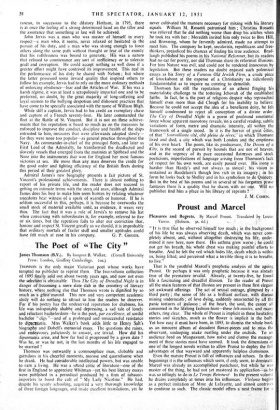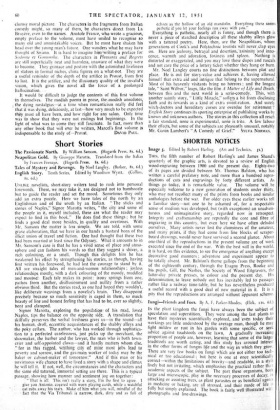Proust and Marcel
Pleasures and Regrets. By Marcel Proust. Trawl' led by Lout • Varese. (Dobson. 9s. 6d.) "IT is true tliat he observed himself too much ; in the background of his life he was always observing death, which was never com- pletely absent, and, without altogether destroying his life, Under- mined it now here, now there. His asthma grew worse ; he could not get his breath, his whole ehest was making painful efforts to breathe. And he felt the veil which hides life, death which is within us, being lifted, and perceived what a terrible thing it is to breathe, to live."
That is the youthful Marcel's prophetic analysis of the ageing Proust. Or perhaps it was only prophetic because it was already true of the premature invalid. Already, at twenty-five, he found life a fascinating and dreadful illusion. To the reader of Proust all the main features of that illusion are present in these first elegant yet awkward offerings. The act of sexual outrage, glimpsed by 3 third party ; the sense of life as a brilliant surface, with disease mining underneath ; of love dying, suddenly resurrected by all the panic tortures of jealousy ; of the heart, the soul, the career all consumed in the lifelong fashion-hunt—these leit-motivs, and many others, ring clear. The whole of Proust is implicit in these hesitating stories and sketches, much as the flower is implicit in the bulb. Yet how easy it must have been, in 1895, to dismis,s the whole book as an innocent album of decadent flower-pieces and to miss the observant, unsleeping snake nestling under the orchids. To an audience bred on Maupassant, how naive and clumsy the manage- ment of these stories must have seemed. It took the dimensions ol one of the longest novels written to allow Proust to deploy the full advantages of that wayward and apparently helpless clumsiness. Even the mature Proust is full of influences and echoes. In the,!. beginnings it is the influences which seem, if only seem, to dominate. Marcel was already an accomplished pasticheur, but while he was master of the thing, he had not yet mastered its application—as he was so tellingly to do in Le Temps Retrouvi In the present volume he drains completely at times into his influences. lifoignie begini as a perfect imitation of Mme , de Lafayette, and almost contrives to continue as such. The classic model offers a neat frame for 3 clumsy moral picture. The characters In the fragments from Italian comedy might, so many of them, be characters direct from La Bruyere, even to the names. Anatole France, who wrote a gracious, empty preface to the volume, must have smiled to recognise so many old and unmistakable voices. But he must have shaken his head over the young man's future. One wonders what he may have thought of Swann. It is hard to imagine hiervwriting a preface for Sodome et Gottiorrhe. The characters in Pleasures and Regrets are still superficially neat and harmless, unaware of what they were to become. They grimace and posture with the astonished liveliness of statues in formal niches, china figures on a what-not. They are a useful reminder of the depth of the artifice in Proust, from first to last. It is the artifice, and the illusionary quality of the invalid's vision, which gives the novel all the force of a prolonged hallucination.
It would be difficult to judge the contents of this first volume -in themselves. The modish poems in prose, the .modish anecdotes, , the dying nostalgias—at a time when romanticism really did feel that it was dying, deliciously, at last—how very much to be expected they must all have been, and how right for any salon. Only time was to show that they were not endings but beginnings. In the light of what was to come they still fascinate. In fact, more than any other book that will ever be written, Marcel's first volume is
indispensable to the study of—Proust. DAVID PAUL.



































 Previous page
Previous page